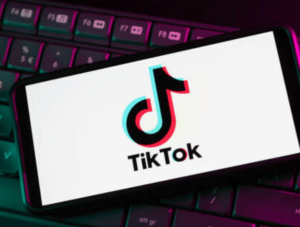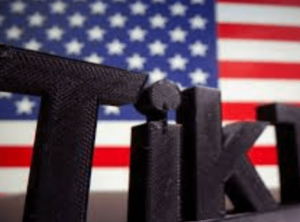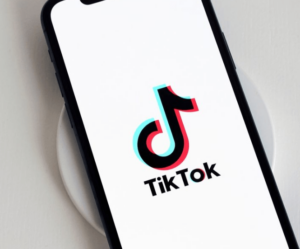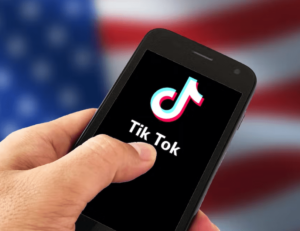TikTok’s future remains uncertain as regulators and lawmakers continue to scrutinize the platform’s handling of user data and potential national security risks.
As the Irish government seeks new security advice in the wake of the European Commission’s ban, it remains to be seen how TikTok will respond to mounting pressure from regulators and lawmakers.

Also Read: TIKTOK STAR: Claire Stone Biography, Family, Career, Ethnicity And Nationality Explored!
Table of Contents
Simon Harris Statement On TikTok Ban In Ireland
In the wake of the European Commission’s decision to ban TikTok, the Irish government is seeking new security advice, according to a statement from Simon Harris, the Minister for Further and Higher Education, Research, Innovation, and Science.1
The move comes after TikTok was previously banned on devices controlled and owned by the U.S. Congress and several states.
TikTok’s CEO, Shou Zi Chew, is scheduled to testify before the U.S. Congress in March to address potential national security risks associated with the platform.
In November, TikTok admitted that its Chinese headquarters had access to the personal data of its users worldwide, sparking concerns about privacy and data protection.
Elaine Fox, TikTok’s head of privacy in Europe, revealed that employees in China, Brazil, Canada, Israel, Japan, Malaysia, the Philippines, Singapore, South Korea, and the United States had access to user data from users in Europe, further exacerbating concerns about the handling of user data.
An investigation by Forbes uncovered evidence that the software was being used to spy on journalists.
The Irish Data Protection Commission is currently investigating TikTok for allegedly transmitting personal information about EU citizens to China without authorization, a breach of GDPR regulations.
Why Is TikTok Under Fire?
- TikTok has come under fire in recent months due to concerns about data privacy and national security. The social media app, which has over 1 billion active users worldwide, has been accused of gathering user data and transmitting it to China without authorization.
- TikTok’s parent company, ByteDance, is based in China, raising concerns about the Chinese government’s access to user data. Additionally, TikTok has been accused of censoring content that is critical of the Chinese government.
- The platform has also faced criticism for its handling of user data. In November 2019, the U.S. government launched a national security review of TikTok, citing concerns about the app’s handling of user data.
- TikTok has denied these allegations, stating that user data is stored in the United States and Singapore, not China. The company has also stated that it has implemented strict data protection measures to safeguard user privacy.
- Despite these assurances, the platform continues to face scrutiny from regulators and lawmakers around the world. The European Commission’s recent ban on TikTok is just the latest in a series of regulatory actions taken against the platform.

BBC Bans TikTok from Company Devices Over Security Concerns
The BBC has taken a bold step as the first major English-language broadcasting company to ban TikTok from its staff’s devices due to data privacy and security concerns.2
This decision comes after the UK government, US government, and European Commission banned the social media platform from staff smartphones, with the British government citing “good security hygiene.”
BBC restricts TikTok on staff deviceshttps://t.co/9qLtvD2Fle
— Adrian Weckler (@adrianweckler) March 20, 2023
Security Concerns Prompted the Ban
According to reports, the ban was prompted by concerns raised by government authorities worldwide regarding data privacy and security.
The broadcaster said in an email to staff that the decision was not a general warning about TikTok’s safety, but rather, the move was based on the security advice given to staff with sensitive work-related information on their phones.
Giving employees security advice on how to safeguard information on their phones is one thing, but banning the app entirely from corporate devices is another.
While the BBC’s hair-splitting on the reasons behind the ban might be seen as a way of retaining its TikTok channel of 1.2 million followers, it’s also possible that the move could be seen as a trend among large organizations and government bodies to limit TikTok’s access to corporate or staff phones.

Also Read: TIKTOK: Is Serbian Dancing Lady Arrested? Viral Video, Real Name, Age And More Details
Governments’ Suspicions of TikTok’s Parent Company
TikTok’s parent firm, Bytedance, has repeatedly denied any access or influence from authorities in Beijing over the social media firm’s data gathering processes or algorithms.
However, some western governments, including Belgium, Canada, and New Zealand, have joined the group of governments limiting TikTok’s availability on staff phones.
In conclusion, while TikTok has become a viral phenomenon worldwide, the app’s security concerns cannot be ignored, especially for organizations with sensitive information.
The BBC’s decision to ban TikTok from its corporate devices sends a message to other large organizations and government bodies to prioritize security over accessibility to social media platforms.
View this post on Instagram
TikTok Banned in Multiple Countries Over Cybersecurity Concerns
TikTok, the popular short-form video app, has faced bans in multiple countries due to concerns over cybersecurity and privacy. Here are the latest updates on where TikTok has been banned and why.3
Belgium
Belgium’s federal government announced last week that it would ban TikTok from devices owned or paid for by the government for at least six months. The ban comes amid fears of cybersecurity threats and misinformation.
Denmark
The Danish Defence Ministry has also announced a ban on TikTok’s use on official units as a cybersecurity measure.

European Union
Earlier this month, the European Parliament, European Commission, and the EU Council all imposed bans on TikTok on staff devices. The ban was enforced due to cybersecurity concerns.
India
In 2020, India banned TikTok and dozens of other Chinese apps due to concerns that user data was being mined and profiled by elements hostile to national security and defense.
Canada
Following the US’s lead, Canada announced a ban on TikTok for government-issued devices due to concerns about privacy and security risks. Employees are also prohibited from downloading the app in the future.
United States
The US has given government agencies 30 days to delete TikTok from federal devices and systems. Although the ban applies only to government devices, some lawmakers are calling for a country-wide ban.
TikTok’s popularity has made it a target for concerns over cybersecurity and privacy. As a result, several countries have taken action to ban the app on government devices, and some have even called for a country-wide ban.
While the app remains accessible in most countries, it’s crucial to monitor the situation as it continues to evolve.

Why TikTok is Banned from UK Government Phones?
TikTok, a social media app that has taken the world by storm, has been banned from government-issued devices in the UK.
The ban came about due to concerns over data privacy and ownership. In this article, we delve deeper into the reasons behind the UK government’s decision to ban TikTok from government phones and why similar actions have been taken by other countries.
Data Privacy Concerns with TikTok
- TikTok’s parent company, ByteDance, is based in Beijing, China. This has led to concerns that the Chinese state could demand access to the data generated by TikTok’s global user base.
- The UK government expressed concern that the app could access user data, including contacts and geolocation, from devices.
- Furthermore, according to a report by the Australian-US cybersecurity firm Internet 2.0, TikTok’s app can access a user’s calendar, other running applications, wifi networks, and even the sim card serial number.
- The UK is not alone in its concerns about TikTok. The US, Canada and the European Commission have also banned or restricted the use of TikTok on government-issued devices.
- They share the same worries about the potential misuse of user data by the Chinese state.
TikTok’s Response to Data Privacy Concerns
TikTok has maintained that user data is stored outside China, in Singapore and the US. The company is also proposing to store American and European user data in third-party servers in the US, Ireland and Norway.
However, this has not alleviated the concerns of critics, who worry that the Chinese state could manipulate TikTok’s recommendation algorithm, which curates what people see on the app’s For You feed.
In conclusion, the UK government’s decision to ban TikTok from government-issued devices is rooted in concerns over data privacy and ownership. The fact that TikTok is owned by a Chinese company has led to worries about potential misuse of user data by the Chinese state.
FAQs
What are the concerns surrounding TikTok’s handling of user data and national security risks?
TikTok’s Chinese headquarters has access to the personal data of its users worldwide. TikTok has been accused of gathering user data and transmitting it to China without authorization. TikTok has also been accused of censoring content that is critical of the Chinese government.
Which countries have banned TikTok and why?
Belgium’s federal government has banned TikTok from devices owned or paid for by the government for at least six months due to cybersecurity threats and misinformation. The Danish Defence Ministry has also banned TikTok’s use on official units as a cybersecurity measure. The European Parliament, European Commission, and the EU Council have banned TikTok.
Why has the BBC banned TikTok from its company devices?
The BBC has banned TikTok from its staff’s devices due to data privacy and security concerns. The ban was prompted by concerns raised by government authorities worldwide regarding data privacy and security. The move was based on the security advice given to staff with sensitive work-related information on their phones.
Why is the Irish government seeking new security advice regarding TikTok?
The Irish Data Protection Commission is currently investigating TikTok for allegedly transmitting personal information about EU citizens to China without authorization, a breach of GDPR regulations. Additionally, TikTok was previously banned on devices controlled and owned by the U.S. Congress and several states.
What has TikTok’s CEO done in response to concerns about national security risks associated with the platform?
TikTok’s CEO, Shou Zi Chew, is scheduled to testify before the U.S. Congress in March to address potential national security risks associated with the platform.
Read More: Azzi Fudd (UConn Huskies Player): Parents Tim And Katie, Siblings, Ethnicity, TikTok With Tyronn Lue




